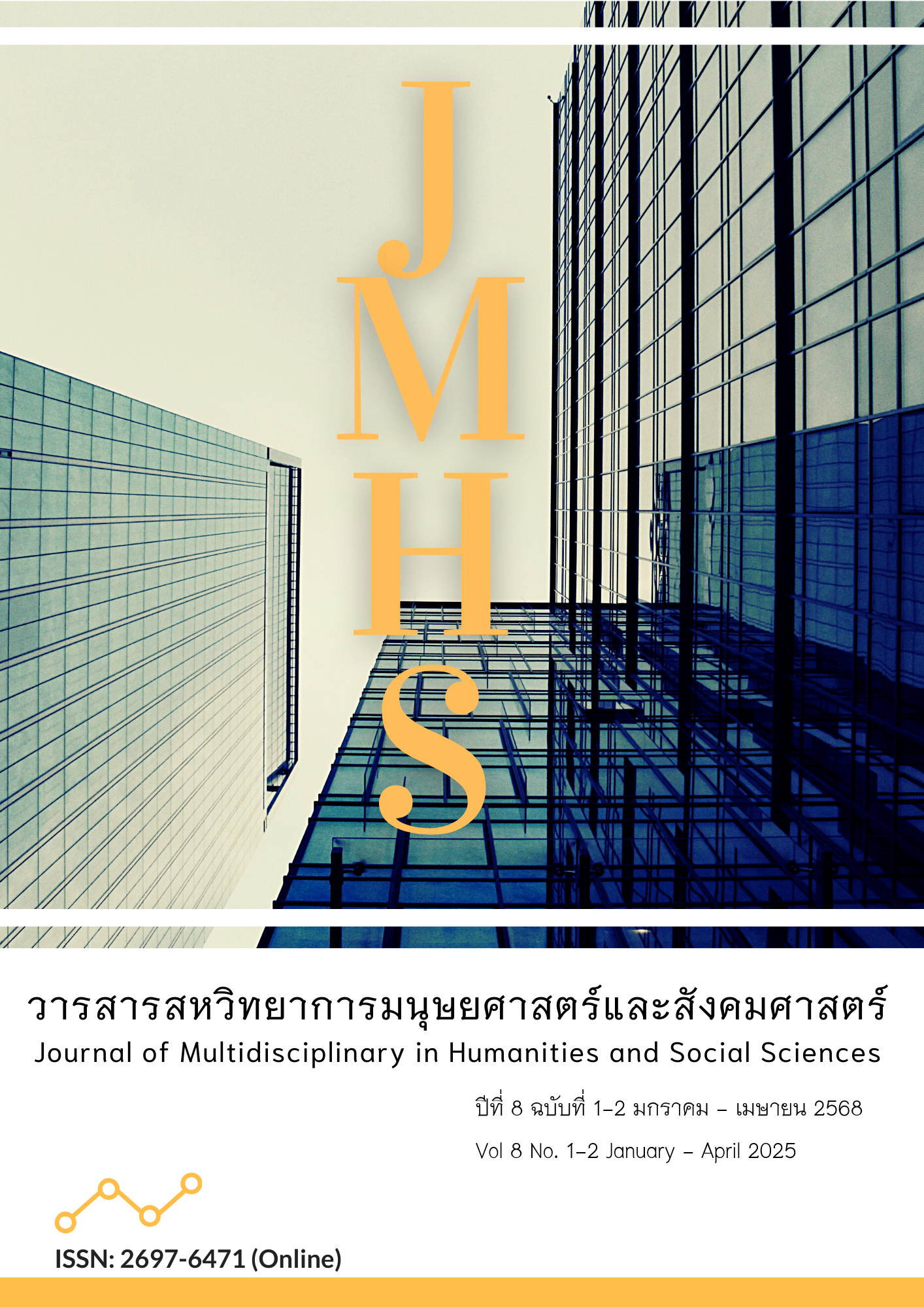Developing Social Change into the Digital Age According to the New Way of Life of Working-Age People in Pathum Thani Province
Main Article Content
Abstract
Thai society has been continuously changing from the past to the present, with digital technology playing an important role, affecting the economy, society, and people’s way of life. This article aims to 1) study the social transformation to the digital age according to the new lifestyle of working-age people in Pathum Thani Province, 2) compare the social transformation to the digital age according to the new lifestyle of working-age people in Pathum Thani Province, classified by personal factors, and 3) study the development guidelines for social transformation to the digital age according to the new lifestyle of working-age people in Pathum Thani Province. The research design is a quantitative research using the concept of the theory of development of social transformation to the digital age according to the new lifestyle as a research framework. The sample group is 400 working-age people in Pathum Thani Province. The statistics used in the research include percentages, frequencies, means, standard deviations, and multiple regression analysis. The research results are as follows:
1. The level of social transformation to the digital age according to the new lifestyle is at a high level overall. When considering each aspect, it is found that attitude is at the highest level, followed by technological capability at a high level, and expectation at a high level, respectively.
2. Results of the comparison of social transformation to the digital age according to the new lifestyle of working-age people in Pathum Thani Province Categorized by personal factors, it was found that working-age people in Pathum Thani Province with different personal factors have changed society to the digital age according to the new way of life that is not different.
3. The approach to changing society to the digital age of working-age people in Pathum Thani Province must focus on changing attitudes and continuously learning about technology. The use of technology in work helps increase efficiency and speed up operations, resulting in work that is more convenient and responds to the digital age more. People should develop computer programming skills and data analysis through training and further education. Organizations and the government should cooperate in promoting learning so that workers can effectively adapt to new work systems, leading to sustainable development.
Article Details

This work is licensed under a Creative Commons Attribution-NonCommercial-NoDerivatives 4.0 International License.
Views and opinions appearing in the Journal it is the responsibility of the author of the article, and does not constitute the view and responsibility of the editorial team.
References
กชพร เลาหเจริญ และ เฉลิมพร เย็นเยือก. (2564). ความคิดสร้างสรรค์ในการปฏิบัติงานของบุคลากรสังกัดองค์การปกครองส่วนท้องถิ่นในเขตจังหวัดปทุมธานี. วารสารบริหารการพัฒนานวัตกรรมเชิงบูรณาการ, 1(1), 29-39. สืบค้นจาก https://so12.tci-thaijo.org/index.php/IIDMJ /article/view/971
กรมอนามัย, กระทรวงสาธารณสุข. (2566). ระบบสารสนเทศสนับสนุนงานส่งเสริมสุขภาพและอนามัยสิ่งแวดล้อม. สืบค้นจาก https://dashboard.anamai.moph.go.th/kpis/portal/view?id=31
จักรกฤษ กมุทมาศ. (2564). แนวโน้มของการประยุกต์ใช้เทคโนโลยีดิจิทัลสำหรับการบริหารงานองค์กรปกครองส่วนท้องถิ่น: กรณีศึกษาเทศบาลในพื้นที่ขอนแก่นเมืองอัจฉริยะ. วารสารบริหารธุรกิจและการบัญชี มหาวิทยาลัยขอนแก่น, 6(3), 77-101. สืบค้นจาก https://so04.tci-thaijo.org/index.php/kkbsjournal/article/view/242644
ชนิสรา ผนึกทอง และ จรัญญา ปานเจริญ. (2564). ความพร้อมรับการเปลี่ยนแปลงของประชาชนวัยทำงาน กรุงเทพมหานคร ในยุค Digital Transformation . วารสารสุทธิปริทัศน์, 35(2), 94–111. สืบค้นจาก https://so05.tci-thaijo.org/index.php/DPUSuthiparithatJournal/article/view/249884
ธัญธัช วิภัติภูมิประเทศ. (2562). สังคมวิทยาดิจิทัล : แนวคิดและการนำไปใช้. วารสารราชภัฏสุราษฎร์ธานี, 6(1), 43-55. สืบค้นจาก https://so05.tci-thaijo.org/index.php/srj/article/view/187959
พระมหากฤษฎา กิตฺติโสภโณ, พระปลัดระพิน พุทฺธิสาโร และ สุภัทรชัย สีสะใบ. (2564). การพัฒนาศักยภาพและโอกาสของคนรุ่นใหม่ในการออกแบบอนาคตชุมชนเชิงสร้างสรรค์. วารสาร มจร สังคมศาสตร์ปริทรรศน์, 10(1), 1-13. สืบค้นจาก https://so03.tci-thaijo.org/index.php/jssr /article/view/249431
สาลีวรรณ จุติโชติ และ ทิพมาศ เศวตวรโชติ. (2564). การดำเนินชีวิตอย่างไรให้มีความในยุคดิจิทัล. วารสารสังคมศาสตร์บูรณาการ, 1(3), 77-88. สืบค้นจาก https://ojs.mbuslc.ac.th/index.php/issj/article/view/61
สุทธิพร แท่นทอง. (2563). ทฤษฎีและการเรียนรู้ในโลกยุคดิจิทัล: ทฤษฎีเชื่อมโยงความรู้และการเรียนรู้แบบผสมผสาน. วารสารสวนสุนันทาวิชาการและวิจัย, 14(1), 79-93. สืบค้นจาก https://so05.tci-thaijo.org/index.php/ssajournal/article/view/256516/
สุรศักดิ์ ศรีธรรมกุล. (2563). การเคลื่อนไหวทางสังคมในยุคดิจิทัล. วารสารมหาจุฬานาครทรรศน์, 7(10), 85-97. สืบค้นจาก https://so03.tci-thaijo.org/index.php/JMND/article/view/247520
Kamkankaew, P., Sribenjachot, S., Wongmahatlek, J., Phattarowas, V., & Khumwongpin, S. (2022). Reconsidering the mystery of digital marketing strategy in the technological environment: opportunities and challenges in digital consumer behavior. International Journal of Sociologies and Anthropologies Science Reviews, 2(4), 43–60. https://doi.org/10.14456/jsasr.2022.29
Yamane, T. (1973). Statistics: An introductory analysis. (3rd ed.). New York: Harper & Row.


